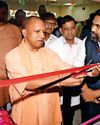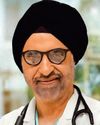Essayer OR - Gratuit
AI ALONE WON'T HEAL INDIA'S HEALTH CARE
THE WEEK India
|November 23, 2025
India needs a mission-driven, public-first approach in using AI for health, not a race to mimic the west

In India, over 65 per cent of health care spending is out of pocket, and access to qualified medical advice is often a privilege reserved for those in big cities. Only about a fifth of cancers are caught in early stages—when they are most treatable—because screening programmes and radiologists are scarce. Even among patients whose cancers could benefit from targeted therapies such as trastuzumab for HER2-positive breast cancer or tyrosine kinase inhibitors for EGFR-positive lung cancer, only about a third receive the necessary diagnostic tests. India has barely a fifth of the radiologists and pathologists it needs, and even fewer oncology experts. The contrast with western systems, where early diagnosis and precision care are routine, is stark.
Artificial intelligence is often hailed as the great equaliser for such shortages. But we must be clear about what it can—and cannot—do. AI cannot conduct clinical trials, invent drugs, perform surgeries, or offer the empathy that defines care. What it can do is improve prevention, early detection, diagnosis, treatment planning and hospital operations. It can transcribe notes, route patients efficiently, predict resource needs and flag anomalies in scans for doctors to review. Used wisely, AI can be the overworked doctor's ally and force multiplier, not his or her replacement.
Yet health care is not a market commodity. Education, policing, defence and health care exist for public welfare, not shareholder value. Left to market forces, profit motives can lead to unnecessary procedures, inflated claims and catastrophic medical debt—as the US experience shows. If guided solely by commercial interests, AI-driven health care risks deepening inequities and creating new silos. The government must therefore play a pivotal role, not just as regulator, but as a mission leader ensuring AI serves national health goals first.
Cette histoire est tirée de l'édition November 23, 2025 de THE WEEK India.
Abonnez-vous à Magzter GOLD pour accéder à des milliers d'histoires premium sélectionnées et à plus de 9 000 magazines et journaux.
Déjà abonné ? Se connecter
PLUS D'HISTOIRES DE THE WEEK India

THE WEEK India
AI ALONE WON'T HEAL INDIA'S HEALTH CARE
India needs a mission-driven, public-first approach in using AI for health, not a race to mimic the west
4 mins
November 23, 2025

THE WEEK India
A Lifeline of Hope Compassionate Revolution ft. Sushena Health Foundation
In a world often focused on metrics and outcomes, a quiet but profound revolution based on compassion and equitable access is being envisioned.
2 mins
November 23, 2025

THE WEEK India
Precision is the New Default Why Robotic Surgery Has Become the Mainstream
In a world where our phones unlock with a glance and our cars can drive themselves, it would be unfair if the operation theatre remained trapped in yesterday's technology. Surgery today is about purposeful precision with every movement measured, every outcome intentional. The evolution of robotic surgery represents this very shift — from ‘good enough’ outcomes to outcomes that are consistently excellent and predictable.
1 mins
November 23, 2025

THE WEEK India
New kids on the stage
For these next-gen actors, theatre holds as much appeal as stardom in cinema
5 mins
November 23, 2025

THE WEEK India
Precision Driven IVUS-NIRS Technology is Transforming Cardiac Care
Dr Balbir Singh, Chairman and Head of Cardiology at Max Healthcare, is a recipient of numerous prestigious honours, including the Padma Shri, for his exceptional skills and contributions in interventional cardiology and electrophysiology. Dr Singh has performed thousands of Intra-Vascular Ultrasound (IVUS) driven Angioplasties. IVUS is used in angioplasty to provide doctors with a detailed, real-time, three-dimensional view of the artery's interior, which helps them to precisely assess blockages, guide stent placement, and confirm the success of the procedure.
3 mins
November 23, 2025

THE WEEK India
White Spot Lesions in Dentistry
White spot lesions (WSLs) are the earliest visible signs of dental caries, appearing as chalky white or opaque areas on tooth surfaces. They indicate early enamel demineralization and can be seen with the naked eye. Early recognition and management are essential to prevent progression into cavities.
1 mins
November 23, 2025
THE WEEK India
The New Age of Spine Surgery
Taking care of your spine begins with small, consistent habits. Maintaining correct posture while sitting or lifting, walking regularly, and strengthening back and core muscles can go a long way in preventing problems. Eating a balanced diet and keeping body weight under control also help reduce stress on the spine.
1 min
November 23, 2025

THE WEEK India
THE RED FLAG IN YOUR URINE: Understanding and Detecting Bladder Cancer
The bladder is an organ which stores urine, which is produced by the kidneys. The bladder is a hollow, viscus organ that holds it for a few hours before it is eliminated. While it can occur at any age, the median age of diagnosis is typically 70 years or older.
1 mins
November 23, 2025

THE WEEK India
INTERNATIONAL QUALITY HEALTHCARE MADE AFFORDABLE IN VELLORE
Naruvi Hospitals, creating new benchmarks in affordable world class health care, spreading its ‘Fragrance of Care’ in Vellore, and beyond.
4 mins
November 23, 2025

THE WEEK India
Richardsons Face Hospital
India's first face hospital
1 mins
November 23, 2025
Listen
Translate
Change font size
